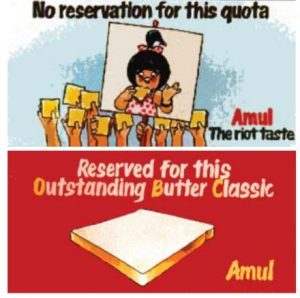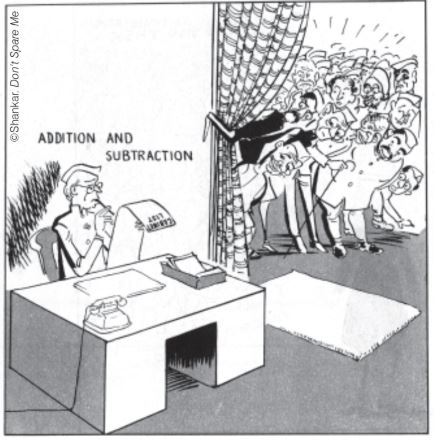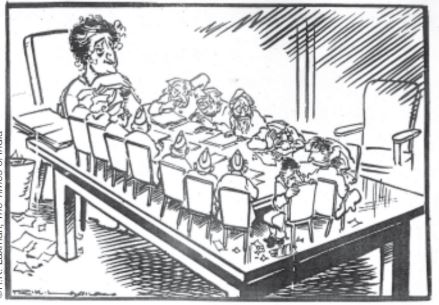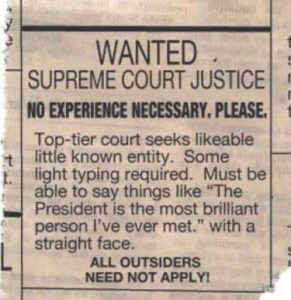NCERT Solutions for Political Science
Chapter 5 – Working of Institutions
Intext Questions
Page 80
Question 1 Is every office memorandum a major political decision? If not, what made this one different?
Answer Every office memorandum is not a major political decision. Most of them are routine in nature. This office memorandum relating to reservation for the Socially and Economically Backward Classes (SEBC) in government services was different because it affected all the sections of society, the SEBC’s in a positive way and the other classes in a negative way. This reservation issue was a major source of controversy for several years and led to many agitations and court cases.
Question 2 (i) Which points, other than the ones mentioned above, do you recall about these institutions from the previous class? Discuss in class.
(ii) Can you think of a major decision made by your State Government? How were the Governor, the Council of Ministers the State Assembly and the courts involved in that decision?
Answer
(ii) An example of a major decision is given here. There have been many others. A major decision taken by the Uttar Pradesh State Government in 2008 was not to allow the Reliance Group to open their retail shops selling vegetables and fruits in the states, as it would harm the interests of the small traders selling these items. This order was approved by the Council of Ministers and the order was promulgated by the Governor. Since it did not involve finances, it was not raised in the State Assembly. The courts were in no way involved, as it did not have any Constitutional implications.
Question 3 Reservation debate was such an important issue during 1990-91 that advertisers used this theme to sell their products. Can you spot some references to political events and debates in these Amul Butter hoardings?
Answer The upper hoarding mentions , ” No reservation for this quota….
Amul the riot taste”. This refers to the riots which took place when the reservation quota was made into a law. Similarly, the lower hoarding says, “Reserved for this outstanding Butter Classic” which again refers to the reservation issue.
Page 81
Question 1 Now I can see clearly. That is why they talk of Mandalisation of politics. Don’t they?
Answer In the LoK Sabha elections of 1989, the Janata Dal Party in its election manifesto promised that if voted to power it would implement the Mandal Commission Report. With this announcement Mandalisation of politics took place and voting was influenced by the Mandal Commission Report.
Page 82
Question 1 Who did what in this case of reservations for backward classes?
| Supreme Court | Made formal announcement about this decision |
| Cabinet | Implemented the decision by issuing an order |
| President | Took the decision to give 27 % job reservations |
| Government Officials | Upheld reservations as valid |
Answer
| Supreme Court | Upheld reservations as valid |
| Cabinet | Took the decision to give 27 % job reservations |
| President |
Made formal announcement about this decision |
| Government Officials | Implemented the decision by issuing an order |
Question 2 Which institutions are at work in the running of your school? Would it be better of one person alone took all the decisions regarding management of your school?
Answer The Principal’s office, the school’s administrative office the different departments like sports department, medical room, library and teachers can be considered the institutions of the school which perform different functions.
No, it would not be good if one person takes all the decisions regarding the management of our school because a large number of activities are going on all the time. It is not possible for one person to take proper decisions on all issues. Even if one person does take these decisions, he or she might not be able to take a proper decision as it might be taken in haste or without
understooding its implications.
Page 84
Question 1 What is the point of having so much debate and discussion in the Parliament when we know that the view of the ruling party is going to prevail.
Answer Though, the view of the ruling party prevails in Parliament, even then we should have debates and discussions because this helps to brine out the positive and negative points of the issue under consideration. The positive aspects might be adopted by the ruling party, and similarly negative aspects could be omitted even if the entire bill is not changed.
Also it is not certain that the ruling party is not open to ideas, and discussions might influence the ruling party to adopt new ideas.
Question 2 When the Parliament is in session, there is a special programme everyday on Doordarshan about the proceedings in Lok Sabha and Rajya Sabha. Watch the proceedings or read about them in the newspapers and note the following
(a) Powers of the two Houses of Parliament.
(b) Role of the Speaker.
(c) Role of the Opposition.
Answer
(a) Powers of the Two Houses of Parliament Details are given in the Constitution. However, we should know that the Lok Sabha members are directly elected by the voters and so are the final voice in the passing of any laws. The Rajya Sabha members are indirectly elected or nominated and they function mostly in an advisory capacity. But the consent of both Houses is required for passing any Bill, making a law, or making amendments to the Constitution.
(b) Role of the Speaker (Lok Sabha) The Speaker’s main functions
1) Regulate the proceedings of the House.
2) Maintain discipline in the House.
3) Supervise Parliamentary Committees.
4) Perform administrative duties like receiving documents, receiving petitions, etc which are addressed to the House.
5) Exercise powers under the anti-defection law.
6) Exercise other powers as given in the Constitution.
(c) Role of the Opposition The major function of the opposition is to act as a check on the ruling party so that any faults of theirs are exposed and any mistakes made by the ruling party are corrected. They can even bring a no-confidence motion against the government if it is
seen to be not functioning properly.
Page 87
Question 1 The race to become minister is not new. Here is a cartoon depicting ministerial aspirants waiting to get a berth in Nehru’s Cabinet after the 1962 elections. Why do you think political leaders are so keen to become ministers?
Answer Political leaders are keen to become ministers for the following reasons
(a) They want to fulfill the promises made to the electorate at the time of elections. In this way, at the time of the next election, they will be in a favourable position to win again.
(b) Becoming a minister gives them many additional powers which they would not have if they were only MPs.
(c) They can fulfill their ambitions and also help many of their family members, associates and friends by sanctioning various schemes which give benefit to them.
Page 88
Question 1 (a) List the names of five Cabinet Ministers and their ministries each at the Union level and in your state.
(b) Meet the Mayor or Municipal Chairperson of your town or the President of Zila Parishad of your district and ask him or her about how the city, town or district is administered.
Answer Names of five Cabinet Ministers and their ministries at the Union level are given below
| Name | Ministeries |
| Manmohan Singh |
Atomic Energy, Space, Personnel, Planning and Public Grievances and Pensions |
| A.K. Antony | Defence |
| Sharad Pawar | Agriculture |
| P.Chidambaram | Finance |
| Sushil kumar Shinde | Home affairs |
Names of five Cabinet Ministers and their ministries at the state level in Uttar Pradesh are given below:
| Name | Ministries |
| Akhilesh yadav | Those which have not been allotted to other ministers |
| Mohammad Azam Khan |
Urban Development, Parliamentary Affairs, Minority Affairs, Urban Poverty Alleviation |
| Shivpal Yadav | Public Works and Irrigation |
| Ahmed Hasan | Health and Family Welfare and Women and Child Welfare |
| Dr Waqar Ahmed Shah |
Health and Family Welfare and Women and Child Welfare Labour |
Question 2 This cartoon depicts a cabinet meeting chaired by Prime Minister Indira Gandhi in the early 1970s, at the peak of her popularity. Do you think similar cartoons could be drawn about other Prime Ministers who followed her?
Answer No, I do not think that similar cartoons could be drawn about any other Prime Minister afterwards. She was a dominant personality and overshadowed everybody else in the Cabinet.
Page 89
Question 1 Why does the book refer to the President as ‘she? Have we ever had a woman President in our country?
Answer 1 The book refers to the President as she to show that the highest office in India can also be occupied by a woman.
Yes, we have had a woman President in our country. Pratibha Patil has been the only woman President of our country.
Question 2 Did you protest when the book referred to the Prime Minister as he? Have we not had a woman Prime Minister? Why should we assume that all the important positions are held by men?
Answer No, I did not protest, when the book referred to the Prime Minister as he because at present we have a male person as a Prime Minister. When we are referring to the post in general we can use her/him simultaneously to show that the said post can be occupied by either males or females.
Yes, we should not assume that all important positions are held by men, women too occupy high positions but that is an exception and not the rule, generally speaking in most of the cases important positions are indeed occupied by men. There is a need to increase the participation of women in politics by providing them at least 1/3rd reservation in the State Assemblies and Parliament.
Page 90
Question 1 What is better for a democracy: a Prime Minister who can do whatever he wishes or a Prime Minister who needs to consult other leaders and parties?
Answer Both the extreme cases, one in which the Prime Minister can do whatever he wishes and the second case in which the Prime Minister has to consult other leaders and parties are not totally correct. If a Prime Minister is free to do as he wishes, there is a possibility that he might develop authoritarian or dictatorial tendencies.
On the other hand, if all the time he has to consult other leaders and parties it would hamper working of the Prime Minister and the government’s functioning. Therefore, he should have freedom of taking decisions but be should also seek the consultation of other leaders and parties on important issues.
Question 2 Eliamma, Annakutti and Marymol read the section on the President. Each of them had a question. Can you help them in answering these questions?
(a) Eliamma Minister disagree about some policy? Does the view of the Prime Minister always prevail?
(b) Annakutti I find it funny that the President is the Supreme Commander of the Armed Forces. I doubt if the President can even lift a heavy gun. What is the point in making the President the Commander?
(c) Marymol I would say, what is the point in having a President at all if all the real powers are with the Prime Minister?
Answer
(a) Answer to Eliamma The Prime Minister’s view prevails. However, if the President does not agree to some Bill sent for approval, she is empowered to send it back for reconsideration to the Parliament, giving the reasons for doing so. Now, if the Parliament approves it once again, the President cannot stop the Bill. She will now have to approve it.
(b) Answer to Annakutti The Supreme Commander is the one, who gives the orders to fight a war. A commander is not always required to use firearms; only she should have the wisdom (usually after consultation with the senior members of the government and armed forces) to issue the necessary orders.
(c) Answer to Marymol The President is a symbol of the power of the country. The President is required to take decisions on appointing the Prime Minister, who must have majority support. The President has many other functions like appointing Governors of States representing India as Head of State, etc.
Page 91
Question 1 It is quite common in the USA for judges to be nominated on the basis of well-known political opinions and affiliations. This fictitious advertisement appeared in the USA in 2005 when President Bush was considering various candidates for nomination to the Supreme Court.
(a) What does cartoon say about the independence of the judiciary?
(b) Why do such cartoons not appear in our country?
(c) Does this demonstrate the independence of our judiciary?
Answer
(a) It shows that in the USA, the Judiciary is not considered to be independent, in the eyes of the people. It voices the feeling that justices of the Supreme Court there are appointed on their being supportive of the President. Their qualifications and experience are not so much important for their appointment to the US Supreme Court.
(b) Such cartoons do not appear in India because
1) The appointment of justices to the Supreme Court is by a specified procedure which is transparent and does not favour anybody having sympathies with the government.
2) Indian judiciary is considered to be among one of the most independent judiciaries in the world.
3) Judges normally do not speak in favour of or against any politician either of the ruling party or the opposition.
(c) Yes, this definitely demonstrates that our judiciary is independent.
Page 92
Question 1 Why are people allowed to go to courts against the government’s decisions?
Answer Sometimes, the actions of the government or a law passed by the government might hurt the public interest or might be against the spirit of the Constitution. In such cases, citizens have the right to go to court to get justice. Such cases are called Public Interest Litigations. (PILS)
• In case of violation of Fundamental Rights by the government, the citizen can go to the courts for justice.
• The Right to Constitutional Remedies provides that if the Fundamental Rights are violated, the citizen can go to court to seek a remedy.
Question 2 Give one reason each to argue that Indian judiciary is independent with respect to
(a) Appointment of judges.
(b) Removal of judges.
(c) Powers of the judiciary.
Answer 2 (a) Appointment of Judges The judges of the Supreme Court and the High Courts are appointed by the President on the recommendation of the Prime Minister and in Consultation with the Chief Justice of India. In actual practice, the senior judges of the Supreme Court select new judges for the Supreme Court as well as for the High Courts. Here seniority and merit are the main considerations with hardly any scope for manipulation by anybody.
(b) Removal of Judges The procedure of removal of judges of the Supreme Court and High Courts is very difficult to actually carry out.They can be removed only on the basis of an impeachment motion passed by two-thirds majority in both Houses of Parliament separately. So removal of judges cannot be Done arbitrarily.
(c) Powers of the Judiciary The powers are clearly spelt out in the Constitution and they cannot be diluted by Parliament or by any Presidential order. So no politician can reduce or increase their powers. The Supreme Court has the power to declare illegal any law made by Parliament if it goes against the Constitution.
Exercises
Question 1) If you are elected as the President of India which of the following decision can you take on your own?
(a) Select the person you take on your own
b) Dismiss a Prime Minister who has a majority in Lok Sabha
(c) Ask for reconsideration of a bill passed by both the Houses
(d) Nominate the leaders of your choice to the Council of Ministers
Answer 1) (c) Ask for reconsideration of a bill passed by both the Houses
Question 2) Who among the following is a part of the political executive?
(a) District Collector
(b) Secretary of the Ministry of Home Affairs
(c) Home Minister
(d) Director General of Police
Answer 2) (c) Home Minister
Question 3) Which of following statements about the judiciary is false?
(a) Every law passed by the Parliament needs approval of the Supreme Court
(b) Judiciary can strike down a law if it goes against the spirit of the Constitution
(c) Judiciary is independent of the Executive
(d) Any citizen can approach the courts if her rights are violated
Answer 3) (a) Every law passed by the Parliament needs approval of the Supreme Court
Question 4) Which of the following institutions can make changes to an existing law of the country?
(a) The Supreme Court
(b) The President
(c) The Prime Minister
(d) The Parliament
Answer (d) The Parliament
Question 5 Match the ministry with the news that the ministry may have released
| (a) A new policy is being made to increase the jute exports from the country. | (i) Ministry of Defence |
| (b) Telephone services will be made more accessible to rural areas. |
(ii) Ministry of Agriculture, Food and Public Distribution |
| (c) The price of rice and wheat sold under the Public Distribution System will go down. | (iii) Ministry of Health |
| (d) A pulse polio campaign will be launched. | (iv) Ministry of Commerce and Industry |
| (e) The allowances of the soldiers posted on high altitudes will be increases |
(v) Ministry of Communications and Information and Technology |
Answer
| (a) A new policy is being made to increase the jute exports from the country. | (iv) Ministry of Commerce and Industry |
| (b) Telephone services will be made more accessible to rural areas. | (v) Ministry of Communications and Information and Technology |
| (c) The price of rice and wheat sold under the Public Distribution System will go down. | (ii) Ministry of Agriculture, Food and Public Distribution |
| (d) A pulse polio campaign will be launched. | (iii) Ministry of Health |
| (e) The allowances of the soldiers posted on high altitudes will be increases | (i) Ministry of Defence |
Question 6 0f all the institutions that we have studied in this chapter, name the one that exercises the powers on each of the following matters.
(a) Decision on allocation of money for developing infrastructure like roads, irrigation etc and different welfare activities for the citizens.
(b) Considers the recommendation of a Committee on a law to regulate the stock exchange.
(c) Decides on a legal dispute between two State Governments.
(d) Implements the decision to provide relief for the victims of an earthquake.
Answer
(a) Parliament (Lok Sabha Money Bill)
(b) Parliament
(c) The Supreme Court
(d) The Executive
Question 7 Why is the Prime Minister in India not directly elected by the people?
a) In a Parliamentary democracy only the leader of the majority party in the Lok Sabha can become the Prime Minister.
b) Lok Sabha can remove the Prime Minister and the Council of Ministers even before the expiry of their term.
c) Since the Prime Minister is appointed by the President there is no need for it.
(d) Direct election of the Prime Minister will involve lot of expenditure on election.
Answer The most appropriate answer is option ‘a’. The Prime Minister should be a person who has the support of the majority of the members so that he has no difficulty in implementing his policies and passing of laws in Parliament. Secondly, since he is the leader of the majority party, he cannot act and take decisions all by himself or become a dictator.
Question 8 Three friends went to watch a film that showed the hero becoming Chief Minister for a day and making big changes in the state. Imran said this is what the country needs. Rizwan said this kind of a personal rule institutions is dangerous. Shankar said all this is a fantasy. No minister can anything in one day. What would be your reaction to such a film?
Answer Such films are unrealistic and cater to the entertainment of people. The actions and decisions shown in the films are not practical.Before taking big decisions or making sweeping changes, there is a need to first consider its positive and negative factors, its advantages and
disadvantages, which needs time and planning, so such films should not be taken seriously.
Question 9 A teacher was making preparations for a mock Parliament. She called two students to act as leaders of two political parties. She gave them an option: Each one could choose to have a majority either in the mock Lok Sabha or in he mock Rajya Sabha. If
this choice was given to you, which one would you choose and why?
Answer I would choose to have a majority in the mock Lok Sabha because the Lok Sabha is more powerful that the Rajya Sabha in the following ways
(a) Money Bills can originate only in the Lok Sabha.
(b) In case of a joint session, the Lok Sabha prevails in the voting because it has more members.
(c) The Council of Ministers are responsible and answerable to the Lok Sabha.
(d) The Lok Sabha is directly elected by the voters of the country and represents the will of the people.
Question 10 After reading the example of the reservation order, three students had different reactions about the role of the judiciary. Which view, according to you, is a correct reading of the role of judiciary?
(a) Srinivas argues that since the Supreme Court agreed with the government, it is not independent.
(b) Anjaiah says that judiciary is independent because it could have given a verdict against the government order. The Supreme Court did direct the government to modify it.
(c) Vijaya thinks that the judiciary is neither independent nor conformist, but acts as a mediator between opposing parties.
The court struck a good balance between those who supported and those who opposed the order.
Answer (b) The view of Anjaiah is the correct regarding of the role of the judiciary. It has to act independently and will not mediate between parties.




Very nice I like this study very much overall very good teacher you are
Very nice Like this study very much overall very good teachers you are
Wow!
Nice you helped me a lot I was looking for these intext questions and I couldn’t found. You have explained the answers nicely. Thanks for answers.